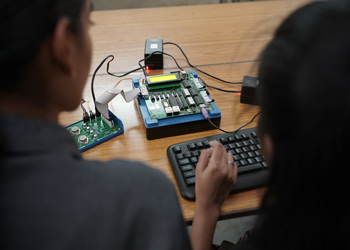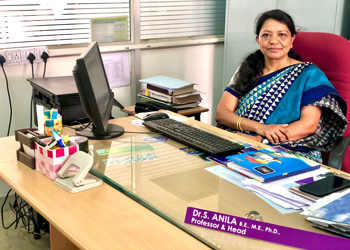Electronics and Circuits Laboratory
The lab is equipped with equipment such as DSO(100 MHZ), CRO(30 MHz), Function Generator (3 MHz), Single Power Supply (0-32V), Dual Power Supply (0-32V), Digital & Analog Trainer Kit, Digital & Analog IC Tester and meters with various ranges. The cathode ray oscilloscope is used to display measure and analyze various waveforms of various electronic circuits. Digital storage oscilloscope is an oscilloscope which stores and analyses the signal digitally rather than using analogue techniques. It is now the most common type of oscilloscope in use because of the advanced trigger, storage, display and measurement features which it typically provides.
Microprocessor Laboratory
Microprocessor Laboratory is equipped with 8086 and 8051 Trainer kits. A microprocessor is designed to perform arithmetic and logic operations that makes use of registers.
Typical microprocessor operations includes adding, subtracting, comparing two numbers and fetching numbers from one memory space to another.
These operations are the result of a set of instructions that are part of the microprocessor design.
Stepper motor Controller, ADC, DAC, Keyboard and Display controller(8279) can be interfaced with 8086 and 8051 for conducting interfacing based experiments.
Microsoft Assembler(MASM) is used for simulation of microprocessor and microcontroller based programs. ECE,CSE,IT,EEE students use this laboratory for their laboratory courses in their programme.
Microwave & Optical Communication Laboratory
Microwave & Optical Communication Laboratory is equipped with well-maintained Major and Minor Equipment’s. The major equipment’s are Klystron Bench -J Band, Microwave Power Meter, X Band Microwave Component, Radiation Pattern Table, Gunn Power Supply, PIN Modulator, Isolator, Variable Attenuator, Direct Reading Frequency Meter , Fiber Optic Components, LASER Diode, BCK Splicing Kit, Advanced fiber optic communication kit - BER module and Programming Library Software. The microwave laboratory is equipped with X band as well as J band bench setups which provide the necessary support for training the students in the area of RF and Microwave engineering. The Optical laboratory is well equipped with advanced Optical fiber trainer kits which help the students to analyze the numerical aperture, attenuation measurements and also to measure the analog and digital transmission characteristics. The LED and LASER diode units in the Optical lab are used to measure the source and detector characteristics. The laboratory square area is 90 sq.m. This laboratory enables ECE students to perform various experiments in the area of Microwave Engineering, Optical Communication and Antenna analysis.
Electronic System Design Laboratory
The lab is equipped with equipments such as DSO (100 MHZ), CRO (30 MHz),
Function Generator (3 MHz), Single Power Supply (0-32V), Dual Power Supply (0-32V) Digital & Analog Trainer
Kit with various ranges, ARM Processors, Programmable Logic Controller Kit, Digital and Analog IC Tester, Micro Controller Based Strain Gauge
Trainer Kit, Micro Controller Based Thermocouple Trainer Kit, Micro Controller Based LVDT Trainer Kit, Embedded Trainer Kits with ARM Board and also Embedded Trainer Kits for Wireless Communication.
The cathode ray oscilloscope is used to display and analyze various waveforms of electronic circuits.
Digital storage oscilloscope is an oscilloscope which stores and analyses the signal digitally rather than using analogue techniques.
It is now the most common type of oscilloscope in use because of the advanced trigger, storage, display and measurement features which it typically provides.
With the help of Digital and Analog IC Tester working conditions of various IC’s can be tested within a fraction of seconds.
Embedded Trainer Kits can be used to implement various embedded systems for real time applications.
Digital Signal Processing Lab/VLSI Laboratory
Digital Signal Processing Laboratory is equipped with software such as MATLAB, LabVIEW, XILINX, TANNER, ORCAD, L-SIM and N-SIM Protocol Simulation Software and Mentor Graphics HEP Category
2. Design and Verification Test FPGA to carry out regular laboratory experiments and research projects in areas such as Digital Signal Processing, VLSI, Computer Networks, and Electronics Circuits. DSP Processor Kits, Xilinx Spartan FPGA Kits, Spectrum Analyzer, CRO, Function Generator, and other hardwares are available at the Digital Signal Processing Laboratory.
RF and Communication Laboratory The RF and Communication Laboratory focuses on training the students in both analog and digital transmission/reception of signal and is equipped with Spectrum Analyzer, Digital Storage Oscilloscopes, Network Analyzer, RF Signal Generator, RF Transmitter and Receiver, Antennas with measurement system, RF & MIC Circuit design components, and Communication Trainer Kits like AM, FM, PAM, PWM, PPM, PCM, DM/ADM, ASK, FSK, PSK, QPSK, TDM, FDM. The facilities available in the laboratory are utilized for teaching and research related activities.
 The Department of Electronics and Communication Engineering was started in 2002. The department offers a four year B.E. Electronics and Communication Engineering Programme with sanctioned intake of 60 from 2002-2003 onwards.
The Department has increased its intake strength to 120 from 2005-2006 onwards.
The department offers M.E. Communication System with an intake of 18 from 2013-2014 onwards.
All the classrooms are smart classrooms with satellite enabled learning facilities.
The Department has 7 Doctorates and 10 of the faculty members are pursuing their research leading to Ph.D. degree.
The department also has young, dynamic and energetic faculty members. Texas Instruments sponsored labs- TI analog System Design Lab and TI Embedded System Design Lab have been set up.
MOU is signed with Roots Group & Salzer Electronics Ltd., Coimbatore, Texas Instruments, Micromax Systems Pvt. Ltd, Trichy, Sertel Electronics Pvt Ltd, Chennai, Prime SoC ,Chennai for undertaking
R&D projects. Faculty members are life members in different professional bodies like IEEE, IETE, ISTE, IETE student forum (ISF) started in the year 2010.
The department is a Recognised Research Centre under Anna University,Chennai.
The department has 3 recognised Supervisors under Anna University,Chennai and are guiding many Ph.D Scholars. Many scholars have completed their Ph.D Degree under the research centre.
The Department of Electronics and Communication Engineering was started in 2002. The department offers a four year B.E. Electronics and Communication Engineering Programme with sanctioned intake of 60 from 2002-2003 onwards.
The Department has increased its intake strength to 120 from 2005-2006 onwards.
The department offers M.E. Communication System with an intake of 18 from 2013-2014 onwards.
All the classrooms are smart classrooms with satellite enabled learning facilities.
The Department has 7 Doctorates and 10 of the faculty members are pursuing their research leading to Ph.D. degree.
The department also has young, dynamic and energetic faculty members. Texas Instruments sponsored labs- TI analog System Design Lab and TI Embedded System Design Lab have been set up.
MOU is signed with Roots Group & Salzer Electronics Ltd., Coimbatore, Texas Instruments, Micromax Systems Pvt. Ltd, Trichy, Sertel Electronics Pvt Ltd, Chennai, Prime SoC ,Chennai for undertaking
R&D projects. Faculty members are life members in different professional bodies like IEEE, IETE, ISTE, IETE student forum (ISF) started in the year 2010.
The department is a Recognised Research Centre under Anna University,Chennai.
The department has 3 recognised Supervisors under Anna University,Chennai and are guiding many Ph.D Scholars. Many scholars have completed their Ph.D Degree under the research centre.  I am very happy to introduce our Electronics and Communication Engineering department as one of the prestigious departments in our college. Thanks to the efforts of our doctorates, teachers and our students, we continue to play a leading role in our discipline. The department has consistently maintained an exemplary academic record. The greatest asset of the department is its highly motivated and learned faculty.
I am very happy to introduce our Electronics and Communication Engineering department as one of the prestigious departments in our college. Thanks to the efforts of our doctorates, teachers and our students, we continue to play a leading role in our discipline. The department has consistently maintained an exemplary academic record. The greatest asset of the department is its highly motivated and learned faculty. 